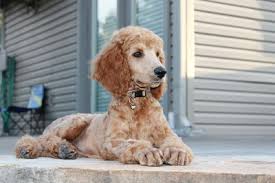Introduction
Apricot Merle Poodle , characterized by striking appearance and unique patterns in their coats. Beautiful effects of mottling made by combining the apricot color with the merle gene make them separate from any other varieties of Poodles. This guide is to inform you about Apricot Merle Poodles-all their characteristics, genetics, and health considerations, breeding practices, and ways of their care.

What is a Poodle Dog?
Types of Poodles
There are three breeds of Poodles: standard, miniature, and toy. The standard Poodle, measuring 15 inches plus over the shoulder, is the biggest of the three breeds. It has gained popularity for its intelligence, versatility, and hypoallergenic coat. Poodles are commonly employed as service dogs, therapy dogs, and performers in dog sports.
Characteristics Overview
The following are the characteristics of Poodles:
- Intelligence: Extremely trainable and fast learners.
- Temperament: Friendly, alert, and sociable, making them good family pets.
- Coat: Curly and dense, which reduces shedding and is hence considered a hypoallergenic breed.
The Merle Gene
What is Merle?
The merle color pattern is somehow characterized by an unusual mottling effect. With patches of lighter and darker tones intermingling, the Merle coat pattern occurs in breeds, but is most striking in Poodles. With the merle gene, pigmentation in the fur of the dog changes to give a beautiful and unique look.
Genetics of the Merle Pattern
The merle pattern is due to a unique allele that changes the dispersion of coloration. One copy of the merle gene will provide the classic merle appearance for a Poodle. If you breed two merle dogs together, the puppies will probably be “double merle,” and they could also face serious health issues, as they might be deaf and have vision impairments.
Apricot Colouring in Poodles
What is Apricot?
Poodles can come in light cream up to a deeper reddish apricot color. Warm color varies with how much intensity there is, and one would view it as a color that has been accepted for the breed. Apricot with the merle gene is a stunning visual effect which is unique and desirable.
Appearance of Apricot Merle Poodles
Apricot Merle Poodles possess a pretty unique fur color pattern. Apricot base color is overlapped with patterns of darker merle. As an effect, they tend to look more mottled than any other coat, which varies greatly from dog to dog. Such a one of a kind appearance is among the reasons this breed has gained so many fans among lovers of dogs.
Health Issues
Overall Health in Poodles
Like all Poodles, Apricot Merle Poodles could be prone to certain health issues. Some of the top health issues this breed could be prone to are:
- Hip Dysplasia: A hereditary disease affecting the hip joint
- Progressive Retinal Atrophy (PRA): A degenerative eye condition that can cause complete loss of vision
- Addison’s Disease: A condition related to an endocrine disorder in relation to hormone production
Health Risks Closely Tied with the Merle Gene
While this genetic variation creates the specific coat color, it also causes specific health issues. Dogs with double merle, meaning they have inherited both copies of the gene, are more likely to suffer from:
- Deafness: Most are born completely deaf, partially deaf, or become deaf sometime in their lives.
- Vision Disorders: These dogs may also have several vision disorders, even blindness.
Responsible Breeding
The best approach to minimize health hazards is by choosing a good breeder who has effectively tested his breeding stock’s health status. A proper and professional breeder will not inbreed two merle dogs together, thus reducing the potential for double merle offspring.

Finding a Responsible Breeder
Looking for Responsible Breeders
To ensure the health and well-being of your Apricot Merle Poodle, look for a good breeder. You can start by researching breeders associated with reputable organizations, among them being, but not limited to, American Kennel Club (AKC), or the Poodle Club of America (PCA). Sometimes these organizations have some referrals for breeders and you could also gather some information on their guidelines for breeders.
Questions for Breeders
Finding the best breeders requires looking into the following questions:
- What health tests do you conduct on the breeding stock?
- Health clearances and genetic testing
How do you socialize puppies?
What is your policy for a return if for some reason I can’t keep the dog?
How do you guarantee ethical breeding practices?
Visitation of the Breeder
If possible, plan to visit the breeder’s site. This will be an opportunity to get an idea of the living conditions and the care that the dogs are used to. A responsible breeder can maintain a clean, spacious area with a capable facility where puppies are well-socialized and cared for.
Caring for Your Apricot Merle Poodle
Grooming Needs
Poodles have a curly, hypoallergenic coat that requires regular grooming to prevent matting. An Apricot Merle Poodle grooming needs:
Brushing: Should be brushed at least two to three times a week to remove the loose hair that causes tangles.
Professional Grooming: A professional grooming is held every 4-6 weeks, so the coat will stay healthy and looking its best.
Bathing: Bathed regularly with dog-specific shampoo to keep it fresh and clean.
Nutrition
The apricot merle poodle feeds on a quality diet. When it comes to feeding your dog, you should look for the top quality dog food that was especially designed for its age, size, and activity level. Your vet can give you recommendations for a suitable diet for your furry friend.
Exercise Requirements
Apricot Merle Poodles are active dogs and require plenty of exercise to make them a healthy and happy dog. In terms of exercise, the goal is at least 30-60 minutes per day with walks, playtime, and interactive activities. Sports or training with the dog provide good exercise for both body and mind.
Training and Socialization
As a foundational training and socialization process, there is great importance in raising an adjusted dog. With a pleaser mentality, Poodles thrive well in positive reinforcement methods. Getting your puppy enrolled in obedience classes would be the best idea to help them learn more about essential commands and social skills.
Life Expectancy of Apricot Merle Poodles
Apricot Merle Poodles have a life expectancy of 12 to 15 years, which is the typical range for standard Poodles. Regular veterinary check-ups, proper nutrition, and an active lifestyle will allow a long and happy life.
Common Myths About Merle Poodles
Myth 1: All Merle Poodles are Unhealthy
Although the merle gene does indeed pose potential health risks, that does not mean every merle Poodle will suffer from health problems. With responsible breeding practices, this can be limited quite significantly.
Myth 2: Merle Poodles Are Rare and Expensive
Even though Apricot Merle Poodles may be one of the lesser colors, the cost is based on the breeder, lineage, and demand. There is no particular reason for them to be inexpensive, but rather health over cost needs to be the guiding light in decision-making.
Myth # 3: Merle Poodles Have Different Temperaments
The color of the coat does not define the temperament of a Poodle. For instance, Apricot Merle Poodles are virtually no different from other Poodles in terms of its loving and intelligent personality.
Conclusion
Apricot Merle Poodles are a distinctive version of the breed along with a regular Poodle. It presents dramatic appearance with a lively nature. Knowing the characteristics, health considerations, and care requirement ensures these owners will give a loving and caring home to their new furry companion. Responsible breeders with a focus on health and ethics can ensure that one gets an Apricot Merle Poodle that is healthy in its life expectancy. Proven care, training, and socialization can ensure this dog thrives as a valued family member for many years to come.

